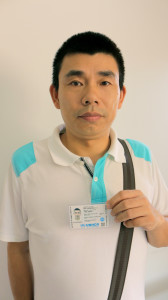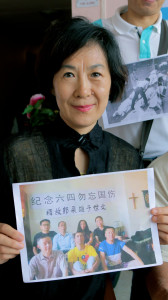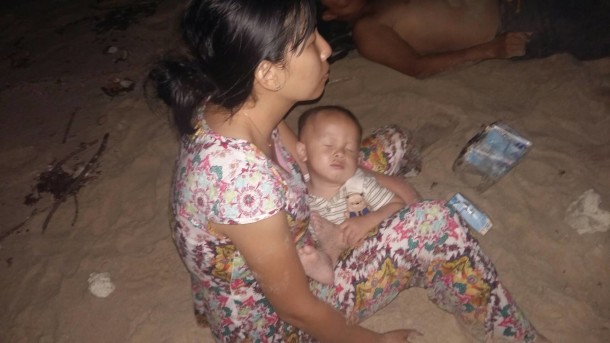You’re always looking over your shoulder. Always wondering if someone’s following you. Those people in the hotel lobby, the Chinese men with dark glasses. Why do they look so familiar? Were they also in Lumpini Park the other day? That couple on the train. Why won’t they stop staring? Oh, they’re looking at the map behind us. Should we take another route home? Change hotels? Have coffee in a different Starbucks? You’re always slightly paranoid, always mindful that you should lower your voice in public, always wondering if you’re going a little mad.
Our experience, lived out in Thailand over three short months, was but a fleeting glimpse into the fearful, desperate lives of the country’s small, but growing community of asylum seekers from China. The United Nations declined to give us official numbers. What we do know is that of the 8,000 or so urban refugees in Thailand, they form a tiny minority. Yet over the past year, they’ve made the news again, and again.
More than a hundred ethnic Uighur asylum seekers were deported to China last July, triggering an outcry from international human rights organisations. Veteran dissidents Jiang Yefei and Dong Guangping were sent back in November, even though they’d already been formally recognised as refugees by the United Nations, and were on the verge of leaving for a third country. And then in January, journalist Li Xin disappeared while attempting to seek asylum in Thailand.
For refugees from China, these developments are both puzzling and frightening. Thailand is not a signatory to the Refugee Convention, but it has, traditionally, been a safe haven for people fleeing persecution. The string of deportations, and Li Xin’s disappearance, signals a change in policy. Speculation continues to swirl over what exactly is going on. No one knows for sure. But every Chinese refugee we interviewed feared they might be targeted next.
*
By the time we met Yu Yanhua in February this year, she was a bundle of nerves. She told us she and her friend and fellow dissident Yan Bojun, had moved several times since arriving in Bangkok in early 2015. Devout Christians, they even switched churches, convinced that their old Bible study group was being infiltrated by Chinese agents.
And yet, despite the immense stress they were both under, Yu and Yan accompanied us on a potentially risky trip to Pattaya in January. Back then, we were investigating the strange disappearance of bookseller Gui Minhai, and they were our guides. Not many people know this, but when Gui vanished, Chinese dissidents living in Thailand were among the first people the missing man’s friends turned to for help.
We learnt about Yu and Yan’s stories during the course of that weeklong shoot in Thailand. The asylum seekers told us about their escape from China, about the crackdown that forced them to leave, and about the dangers they believed they were still facing. They argued constantly – over what was safe and what was not, over whom in their circle they could trust and who was probably a spy, and over how much information to share with us.
*
Every asylum seeker we got to know in Thailand told us they believed they were being watched – by agents from China, by the local police, by strange people they didn’t know. Was it paranoia? It was hard to tell. But the presence of these “spies” – whether real or imagined – hung over all our meetings.
The first time we arranged to interview members of the Falungong religious movement, they insisted on seeing us in a public park, in the middle of the day.
They told us later that they felt they were under constant scrutiny. Thai police had visited their apartment block at least three times in recent months. 30 people from their group had been arrested in the past year, and they believed their building was still being watched.
It was hard not to be affected. When we received an unexpected invitation to have lunch at a Falungong member’s home a few weeks later, we debated over how much gear we should carry – would a tripod draw unnecessary attention? What if we stuffed the camera into a rucksack?
*
As fear and uncertainty grew, a group of asylum seekers decided they had to take action. Their plan – initiated by a democracy activist called Li Xiaolong – was at once simple, and outrageous.
Late at night, on the 29th of February, seven adults and two children – one of them a one-year-old baby – boarded a boat moored at the Thai seaside town of Pattaya. The group had spent more than a hundred thousand dollars buying and upgrading the vessel. Their goal was to sail it to either Australia or New Zealand, where they would then try to seek asylum.
We first learnt about the voyage through a series of frantic messages from Yu Yanhua. Word was spreading within their circle that the boat had run aground just two days after setting sail.
Li would later tell about the huge waves that met them 200 kilometres into the journey. The crew lost control of the boat’s steering and it nearly capsized. Police called in to help refused to recognise the asylum seekers’ UN-issued identity cards. Li’s wife, Gu Qiao, and another refugee, Song Zhiyu, were put in jail for not having valid visas. Li’s own travel documents were in order, but as captain of the boat, he was charged with human trafficking.
We were gobsmacked when we first learnt about the disastrous journey. What on earth were the asylum seekers thinking? How could they have thought they would succeed? But we now know better than to judge – we’ve felt the fear that these refugees live with every single day. It is overwhelming, relentless, exhausting. All Li wanted was to get to a place where he and his family could finally feel safe.
Our documentary ‘No Safe Haven’ aired recently on 101 East, Al Jazeera English. Watch it here, or here.




